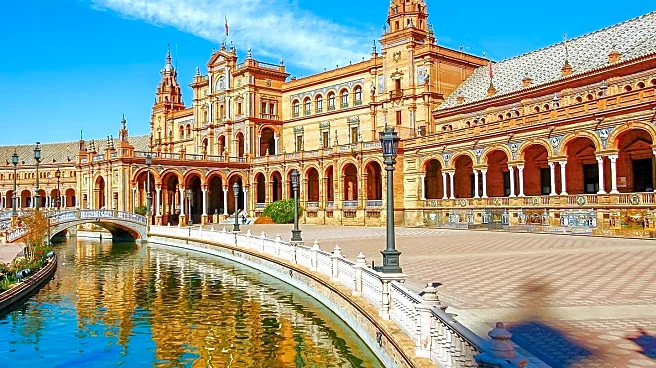What's Happening?
Spain is experiencing a significant surge in tourism, driven by its rich cultural offerings such as flamenco in Seville and surfing in El Palmar. The country ranks as the second most visited in the world,
trailing only France, and is projected to become the most visited by 2040. This influx of tourists has sparked controversy, particularly in cities like Barcelona, where locals have protested against short-term rentals that are believed to inflate housing costs. Despite these tensions, Spain continues to attract visitors with its historic sites, vibrant markets, and culinary delights, as evidenced by the experiences of a group from Northeastern University's School of Journalism during their study abroad program.
Why It's Important?
The tourism boom in Spain highlights the delicate balance between economic benefits and social challenges. While increased tourism can boost local economies and create jobs, it can also lead to higher living costs and strain on infrastructure. The protests in Barcelona underscore the growing discontent among residents who feel the negative impacts of tourism, such as increased housing prices and overcrowding. This situation serves as a cautionary tale for other popular tourist destinations, including those in the U.S., where similar issues could arise as tourism continues to grow.
What's Next?
As Spain's tourism industry continues to expand, local governments may need to implement policies to manage the influx of visitors and address residents' concerns. Potential measures could include regulating short-term rentals, investing in infrastructure improvements, and promoting sustainable tourism practices. The ongoing dialogue between stakeholders, including local communities, businesses, and policymakers, will be crucial in finding solutions that balance economic growth with social well-being.
Beyond the Headlines
The rise in tourism in Spain also raises questions about cultural preservation and the impact of globalization. As more tourists flock to popular destinations, there is a risk of cultural homogenization, where local traditions and identities may be overshadowed by commercial interests. This trend could lead to long-term shifts in how cultural heritage is valued and maintained, prompting discussions on the ethical responsibilities of tourists and the tourism industry.











